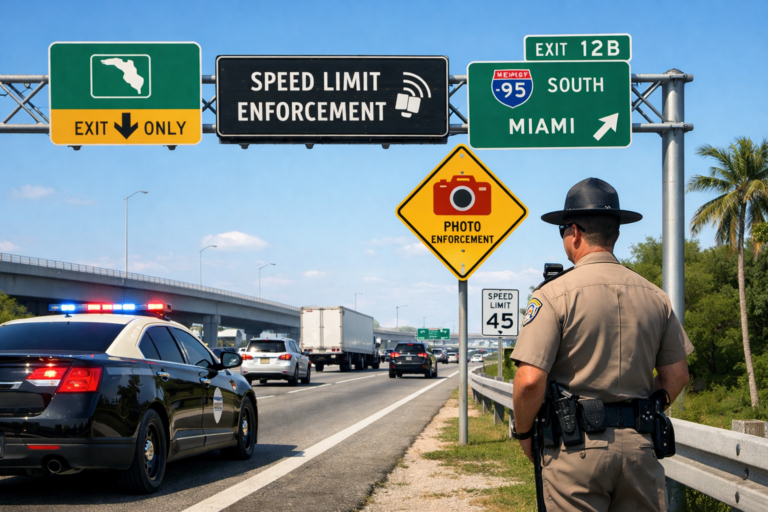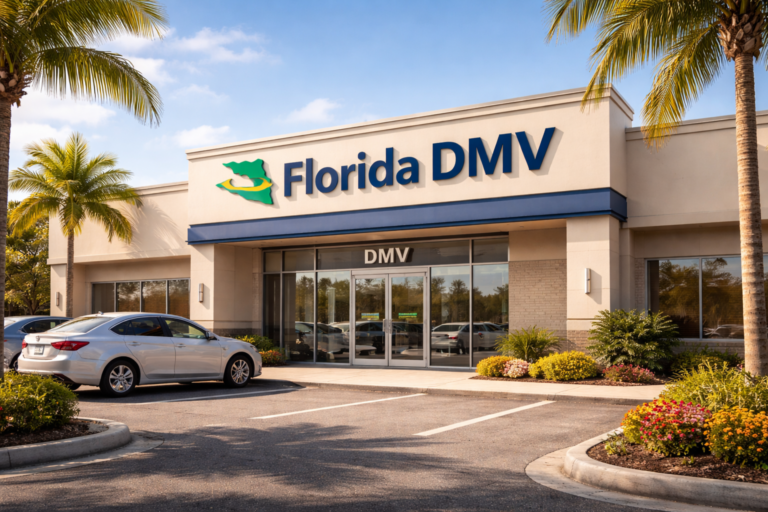We’ve been keeping a close eye on the Florida legislative sessions this year, and let’s just say July 1, 2025, is shaping up to be a significant day for anyone who drives—or even boats—in the Sunshine State. From speed demons on I-95 to teenagers itching for that first driver’s license, the rulebook is about to look very different.
Yet another set of laws become effective Oct. 1st, 2025. Click here for a full overview.
At The Ticket Clinic, we’ve been reviewing every word of these new laws. Frankly, some of them could dramatically change the stakes for Florida drivers. So we wanted to break it all down, in plain English, to help folks understand exactly what’s coming—and why it matters.
Super-Speeders Beware: Criminal Charges Ahead
If there’s one law that’s got everyone buzzing, it’s the new crackdown on extreme speeding. Until now, getting clocked at triple-digit speeds was costly and stressful, but it usually stayed in the realm of civil infractions. That’s about to change in a big way.
Starting July 1, anyone caught:
- Driving 50 mph or more over the speed limit, or
- Driving at 100 mph or higher, regardless of the posted limit
will be charged with a criminal offense under CS 351/HB 351.
Here’s what drivers need to know:
- First offense: Possible jail time of up to 30 days and fines up to $500.
- Second or subsequent offenses within five years: The penalties jump to up to 90 days in jail, fines of up to $1,000, and a potential driver’s license revocation for six months to a year.
On top of that, drivers must appear in court.
From a legal perspective, this is a sea change. A conviction could mean a permanent criminal record, steeper insurance premiums, employment complications, and license suspension. We suspect we’ll see a significant spike in cases needing aggressive defense, because the stakes are simply too high for drivers to tackle these charges alone.
Read more about Florida’s new “Super Speeder Law.”
New Rules for Teen Drivers
Teen drivers and their parents will face new hoops to jump through starting July 1. Gone are the days when a four-hour drug and alcohol course and a quick written test were enough for a learner’s permit.
Under the updated laws, drivers ages 15 to 17 must now:
- Complete a state-approved driver education course that goes deeper than the basic Traffic Law and Substance Abuse Education (TLSAE) program.
- Undergo mandatory vision and hearing screenings.
- Pass the Class E knowledge exam, as before.
- Obtain parental consent.
We see this as a well-intentioned effort to reduce crashes involving inexperienced drivers. However, it will add time and possibly more cost to the licensing process. Parents should plan ahead so teenagers don’t hit unexpected delays when trying to get their permits or licenses.
Read more about new rules for teenagers to obtain a license.
Changes to Florida’s “Move Over Law”
Florida’s Move Over Law remains in effect but now drivers must maintain caution when approaching any roadside vehicle displaying flashing lights or hazard signals—including emergency responders, tow trucks, utility vehicles, and disabled cars. This means safely changing lanes away from the roadside vehicle when possible, or otherwise slowing down significantly—typically 20 mph below the posted limit, or 5 mph in very low-speed zones.
However, the headline update for 2025 isn’t a tweak to that law—it’s the introduction of the HALO Law, which came into force on January 1, 2025. This law expands protections beyond public roadways, creating a 25-foot buffer zone around first responders—like police, firefighters, paramedics—as well as tow and utility workers, regardless of whether they’re on highways, parking lots, or sidewalks. If a responder verbally requests you to back off, you must comply. Failure to leave the buffer zone—especially if it hinders their duties—can land you in trouble: a second-degree misdemeanor with penalties up to 60 days in jail and fines reaching $500.
Read our 2025 overview of the “move over law.”
“No Wake Law” Hits The Streets
Florida’s “no‑wake law” officially became active on July 1, 2025. It outlaws driving fast enough through flooded streets to generate large wakes that splash onto homes, yards, sidewalks, or other property. The measure was tucked into Senate Bill 462, a bipartisan transportation package signed by Governor DeSantis. It empowers local jurisdictions—cities and counties—to designate “no wake zones” on any flooded road, and lets police issue citations to offenders.
This law was born from frustration in Pinellas County communities like Shore Acres, Riviera Bay, Largo, and St. Petersburg, where drivers speeding through even moderate floodwater often pushed water into residences and caused property damage. Officers will determine violations based on vehicle speed, road conditions, posted warnings, and the size of the wake splashing onto nearby property—though only violations witnessed by an officer can result in a ticket; video evidence alone isn’t enough. Initially, police will focus on warnings, but fines are coming if behavior doesn’t improve.
The aim is clear: curb reckless driving in flood conditions, protect property and safety, and encourage civic responsibility—especially when Florida’s downpours are part of daily life.
Read more about HB462, Florida’s “no wake law.”
New Protections—and Paperwork—for Boaters
Though we’re focused on traffic defense, we know plenty of our clients spend as much time on the water as on the roads. So it’s worth mentioning the new Boater Freedom Act, also taking effect July 1.
Among the key changes:
- State law enforcement can no longer randomly board vessels without probable cause.
- Boaters can choose to obtain a “Florida Freedom Boater” decal after a successful inspection, potentially helping them avoid stops in the future.
- The law also blocks attempts to restrict which types of fuel or energy sources boaters can use.
These changes could bring much-needed relief to boaters who’ve felt targeted by frequent, seemingly arbitrary stops. But, as always, compliance remains crucial—officers still have authority if they see evidence of violations or safety concerns.
Read more about the changes to boating laws in Florida.
Why These Changes Matter
Laws like these reflect real concerns. Florida ranks high among states for traffic fatalities, and crashes at extreme speeds can cause unspeakable damage. Lawmakers are betting that tougher penalties will finally persuade reckless drivers to slow down.
Similarly, teen drivers statistically have higher accident rates. Lawmakers hope extra training will lower those numbers. And for boaters, the new laws are about balancing public safety with individual rights on the water.
The consequences of these changes are serious. A conviction under the new criminal speeding statute could haunt drivers for years. Teen drivers could face delays and frustration if they’re unprepared for the new process. And boaters could still run afoul of laws if they’re not careful, even with new protections in place.
How The Ticket Clinic Can Help
For more than 35 years, we’ve helped Florida drivers—and boaters—fight tickets, criminal charges, and license suspensions. Our team has handled over 5 million cases. We know the prosecutors. We understand radar technology. We’ve cross-examined officers. And we’ve kept countless drivers from letting traffic citations ruin their driving record.
With these new laws, we anticipate more cases involving criminal speeding charges, especially since mandatory court appearances mean drivers can’t simply pay a fine and walk away. We’re prepared to help build strong defenses, challenge evidence, and help protect clients’ records, licenses, and futures.
If you’re facing charges under these new laws—or any traffic matter—don’t wait until it’s too late. A criminal conviction can affect your job, your insurance, and your peace of mind.
Contact The Ticket Clinic:
- Call us at 1-800-CITATION (248-2846)
- Text a photo of your ticket to 305305
- Or visit The Ticket Clinic website
Our consultations are free, and we’ll talk you through your options with no obligation.
Stay safe, know your rights, and if you find yourself on the wrong side of a flashing blue light, remember: we’re here to help.



